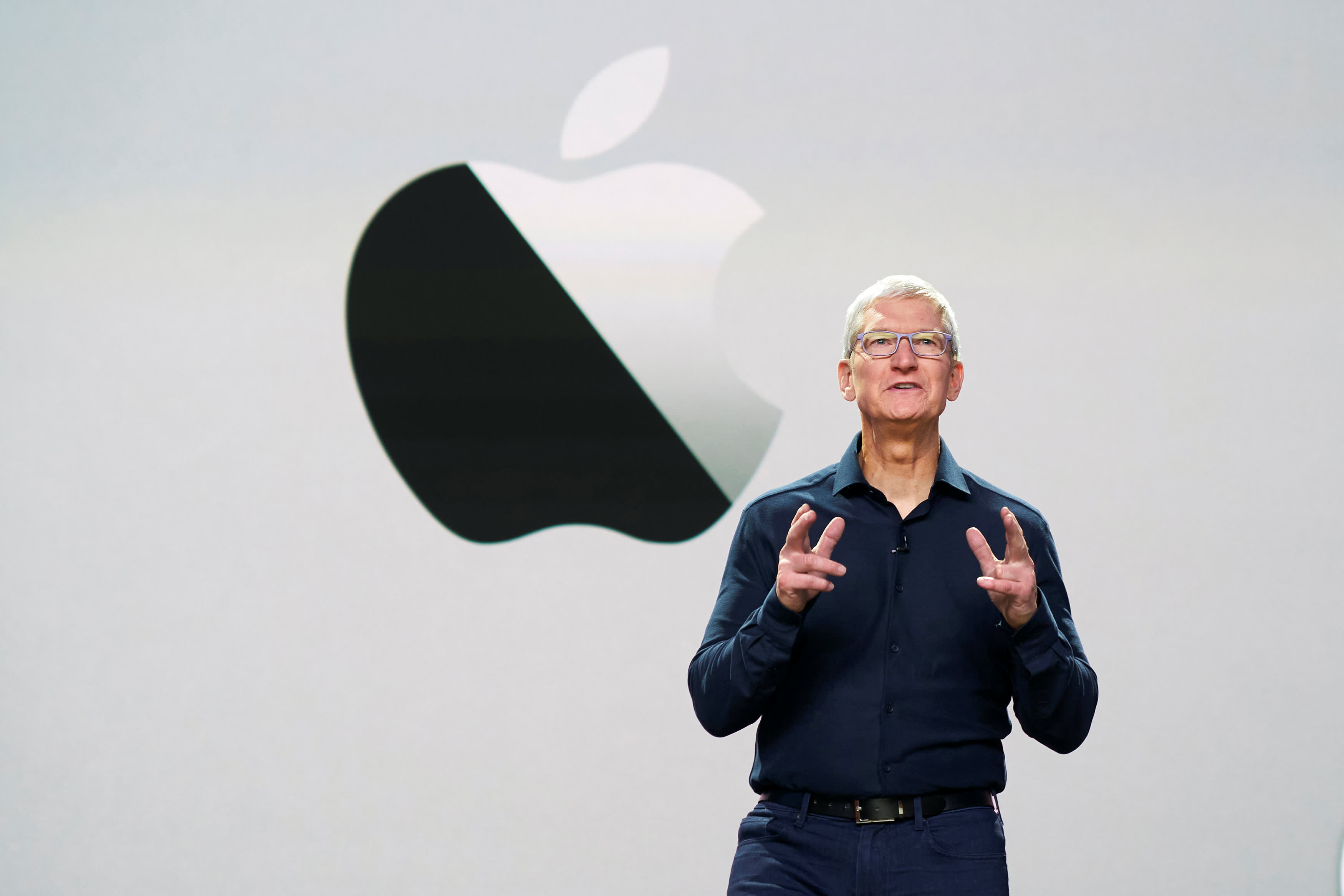AirPods, Now One of Apple’s Most Important Products From alphabanklog
AirPods Are Now One of Apple’s Most Important Products

New Apple products have suffered the undue scorn and ridicule endured by AirPods.
Introduced in late 2016, Apple’s first wireless, Bluetooth earbuds were at first a joke and a meme machine. People thought they looked ridiculous and were certain they’d fall out of your ears and vanish without a trace.
Pictures of me wearing them from the launch event popped up here and there, often with an accompanying laughter emoji. College Humor called them “a legitimately terrible idea,” and perfectly summarized the key concerns (“you’re going to lose them IMMEDIATELY”; “one’s going to fall out of your ear and onto something gross”).
Introduced in late 2016, Apple’s first wireless, Bluetooth earbuds were at first a joke and a meme machine. People thought they looked ridiculous and were certain they’d fall out of your ears and vanish without a trace.
Pictures of me wearing them from the launch event popped up here and there, often with an accompanying laughter emoji. College Humor called them “a legitimately terrible idea,” and perfectly summarized the key concerns (“you’re going to lose them IMMEDIATELY”; “one’s going to fall out of your ear and onto something gross”).
But more than two years and millions of units later, the $159 AirPods have become a Herculean success story. The accessory is now vital to Apple’s future, according to Tim Bajarin, a longtime Apple analyst and president of Creative Strategies, Inc.
“Voice is a new part of the man-to-machine interface, and getting info on demand through a headset tied to services is an important part of what will be
“Voice is a new part of the man-to-machine interface, and getting info on demand through a headset tied to services is an important part of what will be
[Apple’s] future AR strategy,” said Bajarin.
Even if that strategy has yet to be fully communicated to customers, they’re clearly warming to the once-maligned headset. Apple CEO Tim Cook went out of his way to highlight them in an earnings call last year. “This product is a runaway hit, and we’re working hard to meet the incredible demand,” he said.
AirPods sales have helped drive Apple’s wearable segment, which includes Apple Watch and Beats, to $10 billion in revenue between 2017 and 2018.
AirPods sales have helped drive Apple’s wearable segment, which includes Apple Watch and Beats, to $10 billion in revenue between 2017 and 2018.
Put simply, AirPods are a complete success.
This is somewhat surprising, because it took awhile for my perception of Apple’s AirPods to meet reality. When I reviewed the headphones in September 2016, people stared. In those first weeks and months of use, I got the same question over and over again: “Don’t they fall out?”
They never did, and through cleaning, walking, running, or shaking my head vigorously, they never have. Granted, I may have the perfect ear shape for them: My tragus — the fold of skin and cartilage that covers the ear canal — is large enough to make a nice enclosure for the AirPods. I’m assuming this because so many people tell me how they have the wrong-shaped ears and that Apple’s similarly-shaped wired EarPods never stayed put. I would always encourage skeptics to try them before passing final judgement.
They never did, and through cleaning, walking, running, or shaking my head vigorously, they never have. Granted, I may have the perfect ear shape for them: My tragus — the fold of skin and cartilage that covers the ear canal — is large enough to make a nice enclosure for the AirPods. I’m assuming this because so many people tell me how they have the wrong-shaped ears and that Apple’s similarly-shaped wired EarPods never stayed put. I would always encourage skeptics to try them before passing final judgement.
In the meantime, I used my AirPods almost every day. I listened to music, podcasts, and took calls. I’d pop one out of my ear, which automatically paused the audio, to stop by the coffee truck and place my order, and then pop the AirPod back in to keep listening.
Like most of Apple’s best products, AirPods simply work.
Then, somewhere along the way, I started noticing other people wearing AirPods. At first it was just the occasional sighting, like spotting a green parrot in Brooklyn. However, I remember the moment when I stood in a New York City subway car and noticed more than a half dozen people wearing
Like most of Apple’s best products, AirPods simply work.
Then, somewhere along the way, I started noticing other people wearing AirPods. At first it was just the occasional sighting, like spotting a green parrot in Brooklyn. However, I remember the moment when I stood in a New York City subway car and noticed more than a half dozen people wearing
AirPods. Apple’s oddball product had broken through.
AirPods are not succeeding in spite of themselves. They fit better than people expected and contain excellent, if aging, technology. The power-sipping W1 chip makes five-hour battery life in a pair of tiny devices possible. The charging case effortlessly communicates with your iPhone (or Apple Watch) and recharges your AirPods while sitting inside your change pocket. They integrate with Siri and have above-average sound for in-ear audio devices.
Like most of Apple’s best products, AirPods simply work.
Apple rarely talks about the design process behind its products and wouldn’t comment on whether the AirPods’ current success exceeded
expectations. In an interview this month with CNBC’s Jim Cramer — essentially designed to allay concerns about
weaker-than-expected iPhone sales — Tim Cook noted how the company’s success in the wearables category was
driven almost entirely by the Apple Watch and AirPods. He added that the growth has been unprecedented.
“If you take AirPods and the Watch separately, and you sort of back these up and align it to the launch date of iPod… you would find that each one, independently, is, like, four to six times ahead of where iPod was at a comparable period of time,” he said.
While it may seem be odd for a screen less product to achieve this level of prominence in the Apple ecosystem, it does make market sense.
“Apple’s primary strategy is to be a product development company,” Annette Zimmermann, an analyst at Gartner, said. “Meaning, drive growth by introducing new products to market. In that sense,
While it may seem be odd for a screen less product to achieve this level of prominence in the Apple ecosystem, it does make market sense.
“Apple’s primary strategy is to be a product development company,” Annette Zimmermann, an analyst at Gartner, said. “Meaning, drive growth by introducing new products to market. In that sense,
the AirPods are important since they have been well received.”
Interest in the future of AirPods feels more like what you would expect for a feature-rich, stand-alone product like the iPhone
than a typical audio accessory. Rumors about updates started more than a year ago, and many, including me, expected Apple
to introduce some kind of color option, feature, or component enhancement by late last year.
AirPods, however, have remained steadfastly unchanged since Apple introduced them more than two years ago. Now, everyone assumes 2019 is the year of the big update. Most people anticipate AirPods 2 will get the W3 wireless chip, which arrived in the Apple Watch Series 4. Along with Bluetooth 5 support, it should deliver significant improvements in connection speeds and power consumption. Noise cancellation is possible, though I bet Apple skips it, since the effectiveness would be questionable for in-ear headphones. Apple will also finally integrate some health-related features. A heart rate sensor is likely (almost three years after Samsung introduced its heart-rate-sensing wireless IconX earbuds).
The potential addition of health technology will shift AirPods into Apple Watch’s more life-essential category. With Series 4, the Apple Watch could not only monitor our bodies for a damaging fall but could also keep
tabs on our creaky hearts and even run a single-line electrocardiogram. With heart rate monitoring, the oddball
AirPods will seem like a more serious product, though most of that tracking will be exercise-related.
I also wonder if Apple will include some adapters with AirPods 2 — perhaps silicon bits that could slip over
I also wonder if Apple will include some adapters with AirPods 2 — perhaps silicon bits that could slip over
the ear portion to make them better fits for people with, ahem, smaller tragi.
This attention consumers and, ostensibly,
Apple are paying to a mere accessory cannot be understated. The rise of AirPods (and the Apple Watch) comes at a time of diminishing iPhone excitement and sales. The handsets are selling, but not as well as they once did, and without major innovation, it’s unlikely we’ll see another wave of iPhone upgrades in the near-term.
The anticipated updates to AirPods could, according to some experts, supercharge sales. Apple has never broken out unit sales of AirPods, but according to a report from Ming-Chi Kuo of TF International Securities, the number was around 16 million units for 2018. Kuo predicts that number will rise to roughly 100 million by 2021.
The anticipated updates to AirPods could, according to some experts, supercharge sales. Apple has never broken out unit sales of AirPods, but according to a report from Ming-Chi Kuo of TF International Securities, the number was around 16 million units for 2018. Kuo predicts that number will rise to roughly 100 million by 2021.
“We believe that there is a greater likelihood of legacy
iPhone users buying AirPods than upgrading to new iPhone models,” Kuo reportedly said.
Still, AirPods trail behind the money-making elephant in the room: services like the App Store and Apple Pay. “In the greater scheme of things, Apple’s services business is even more important [than AirPods],” said Zimmermann. “Apple’s service business revenue was around $29 billion in 2017 and based on my estimates it will grow to around $39 billion in 2018. This is phenomenal.”
Still, AirPods trail behind the money-making elephant in the room: services like the App Store and Apple Pay. “In the greater scheme of things, Apple’s services business is even more important [than AirPods],” said Zimmermann. “Apple’s service business revenue was around $29 billion in 2017 and based on my estimates it will grow to around $39 billion in 2018. This is phenomenal.”
Plus, even if AirPods do grow to the sales levels Kuo predicted, Apple is unlikely to sell enough to make up for the iPhone shortfall.
That makes business (and math) sense, but there’s no denying that AirPods are primed to become Apple’s most visible product since people wore iPod Nanos on their sleeves. It’s like a tiny, dangling advertisement for how you can join the iOS ecosystem and enjoy Apple’s in-ear technology without ever worrying if you look like a dork — because we all do and yes, we’re proud of it.
That makes business (and math) sense, but there’s no denying that AirPods are primed to become Apple’s most visible product since people wore iPod Nanos on their sleeves. It’s like a tiny, dangling advertisement for how you can join the iOS ecosystem and enjoy Apple’s in-ear technology without ever worrying if you look like a dork — because we all do and yes, we’re proud of it.
You can also buy instant:


Cashapp Money Transfer Click here
Paypal Money Transfer Click here
Western Union Money Transfer Click here
Venmo Money Transfer Click here
Bank Money Transfer Click here to Contact Us
